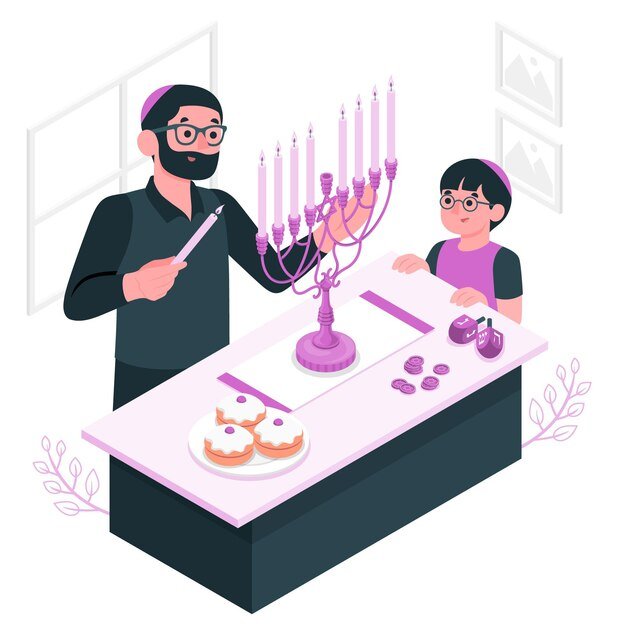The Jewish tradition holds the concept of yahrtzeit, the anniversary of a loved one’s passing, in high regard. This day is revered and serves as a time for remembrance, prayer, and connection to the deceased. Central to this observance is the role of the yahrtzeit companion, an individual who supports and guides the bereaved through the rituals and customs associated with this day. We will explore the significance of Yahrtzeit Companion, how it aligns with Jewish values, and how a yahrtzeit companion provides comfort and structure during this deeply spiritual occasion.
The Meaning and Significance of Yahrtzeit
Yahrtzeit, derived from the Yiddish words for “year” (yahr) and “time” (zeit), marks the annual remembrance of a loved one’s passing. It is a day steeped in spirituality and reflection, where the living honor the departed through specific rituals and acts of kindness.
Traditionally, this includes lighting a memorial candle, reciting the Kaddish prayer, and engaging in acts of tzedakah (charity). The day’s purpose extends beyond mourning; it emphasizes the continuity of memory, the connection between generations, and the sanctity of the soul.
A yahrtzeit companion is essential in facilitating these observances, especially for those unfamiliar with the rituals or seeking support in their execution. By helping with prayer coordination, offering emotional support, or even explaining the deeper meanings behind customs, the companion ensures that the day is marked with appropriate respect and intention. Their presence reinforces the collective responsibility in Jewish tradition to honor the deceased and support the grieving.
The Role of the Yahrtzeit Companion
The yahrtzeit companion serves as a guide, supporter, and sometimes even a confidant for individuals or families observing the anniversary of a loss. Their role is multifaceted, encompassing logistical, spiritual, and emotional dimensions. On a practical level, they may assist with arranging for the recitation of the Kaddish in a synagogue or organizing a study session in memory of the departed. These acts align with the Jewish principle of creating aliyat neshama, or the elevation of the soul.
Beyond logistics, the yahrtzeit companion provides emotional solace. The anniversary of a loss can reignite feelings of grief and longing, and having someone present who understands the significance of the day can be profoundly comforting. Through shared prayer, storytelling, or simply listening, the companion helps the bereaved feel less alone in their journey.
Their role highlights the communal nature of Jewish mourning practices, emphasizing that grief and remembrance are not solitary endeavors but are shared within a supportive network.
Connecting Tradition and Personal Reflection
One of the unique aspects of a yahrtzeit companion’s role is their ability to bridge tradition with personal reflection. Jewish customs surrounding yahrtzeit are deeply rooted in religious texts and practices, but every loss is personal, and every individual’s way of mourning is unique. A companion helps navigate this intersection by encouraging the bereaved to engage with traditions in a manner that resonates with their personal experiences and memories.
For instance, they might suggest acts of chesed (kindness) or tikkun olam (repairing the world) in memory of the deceased, tailoring them to reflect the person’s life and values. This personalized approach makes the observance feel spiritually meaningful and intimately connected to the departed. It also reinforces that remembrance is not merely about looking back but creating a lasting impact that honors the deceased’s legacy.
Spiritual Guidance and Support
Another critical element of the yahrtzeit companion’s role is offering spiritual guidance. For some, the rituals of yahrtzeit may feel unfamiliar or overwhelming, particularly for those who are not deeply observant or are navigating their grief without the presence of close family. A companion can demystify these practices, explaining the significance of lighting the yahrtzeit candle or the nuances of the Kaddish prayer.
Additionally, the companion provides a spiritual anchor, encouraging introspection and connection to the deceased’s memory. They might guide the bereaved in meditative practices, suggest meaningful texts to study, or facilitate moments of quiet prayer. These actions help create a space where the individual can process their emotions while fulfilling the spiritual obligations of the day.
Fostering Communal Connections
Jewish mourning traditions emphasize the importance of community, and a yahrtzeit companion often acts as a bridge to that communal support. They may encourage the bereaved to attend synagogue, participate in communal prayer, or engage with others who have experienced similar losses. These connections help the mourner feel part of a larger shared remembrance and healing fabric.
The companion also reinforces the value of communal responsibility in Judaism. By assisting in the observance of yahrtzeit, they embody the Jewish principle of chessed shel emet (true kindness), which is often associated with acts performed for the deceased, as they can never repay the favor. This principle underscores the selfless and meaningful nature of the companion’s role, highlighting its importance within the broader context of Jewish values.
The yahrtzeit companion occupies a meaningful and multifaceted role in Jewish tradition, supporting and guiding those observing the anniversary of a loved one’s passing. By facilitating rituals, offering emotional and spiritual solace, and fostering a sense of community, they help ensure that the day is marked with intention and reverence. We have explored how this role aligns with Jewish values and enhances the observance of yahrtzeit.
Through their efforts, yahrtzeit companions help transform a day of remembrance into a powerful opportunity for connection, healing, and honoring the memory of the departed.
